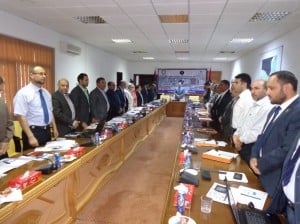By Sami Zaptia.

Tripoli, 30 April 2014:
Part two of the workshop “Strategic Planning for the City Metro (LRT) – A Modern Metro . . .[restrict]for the Public” was held yesterday at the Railways Project Execution and Management Board’s headquarters in Tripoli (www.railroads.org.ly), in cooperation with Zawia University’s Strategic Planning Unit.
The workshop was headed by Ali Rashaida, Chairman of the Railways Project Execution and Management Board, numerous members of the Railway Board, a representative of the Ministry of Transport, Ministry of Housing and Utilities, the Head of the LRT Project, a representative of the NOC, representatives of GECOL, Tripoli Local Council, Benghazi Local Council, the Urban Planning Department, the Information and Documentation Department, Benghazi University, the State Property Department and the Ministry of Agriculture.
During the 1st April part one of the workshop it was revealed that the Railway Board was now making an independent study of the various options that would provide the best cost and best service combination for Libya’s two main cities of Benghazi and Tripoli.
It was also revealed that the Railway Board had been given the green light by the GNC to present the results of this LRT study for urgent implementation in order to solve Tripoli and Benghazi’s pressing transport and traffic problems.

At yesterday’s workshop, Ali Rashaida, Chairman of the Railways Project Execution and Management Board said that “based on correct plans and strategies, the decision to go ahead has been taken by the GNC and we are in the process of implementing a modern and effective city LRT system”.
Mabruk Abugadera, Head of Strategic Planning at the University of Zawia said that ” we chose the metro because it is a vital project and one of the bottlenecks in the two cities transport systems.”
The lack of a clear strategic plan and vision for the utilization of the Railway Board has led to the dispersion of efforts and the inability to gain from the financial resources and human resources in the Railway Board. This has led to the delay in the implementation of the city LRT in Tripoli and Benghazi.
Therefore, strategic planning was adopted in order to put in place a strategic plan for the city LRT with the participation of all the various stakeholders, it was stressed in the introduction of the workshop.

Summarizing the work achieved during the first workshop, Abugadera said that the workshop must first help to set out the main aims, followed by conducting a status update on the projects. The main influencing factors on the LRT projects had to be considered as well as a review of all the available options. Based on this, he explained, the different strategies for going forward could be reviewed and the most optimal one could be selected. The strategy would be updatable.
The six aims and strategies were: Establishing an LRT network that was modern and economically viable that links all the vital sectors of the two cities; the linkage and compliment-ability of the LRT network with other transport systems; increasing the culture of the use of public transport in Libya; the retraining of Libyan human resources and participation in the development of the cities; offering a high quality service and operating and maintaining the network with a high degree of effectiveness.
The Head of Strategic Planning was keen that all stakeholders present and those who were not able to attend the workshop are able to provide input into policies and strategy at the “formulation stage”. He considered stakeholders as the most influencing factors on the implementation of the LRT project, followed by management, the type of LRT system chosen, the overall transport strategy put in place by the Libyan authorities as well as their linkage with other transport systems and infrastructure.
With regards to choosing an underground system, an overland system, a suspended system or a mixed LRT system, this would influence the budget greatly, Abugadera explained. The choice would also affect implementation, logistics, timelines, inconvenience and stakeholders’ inputs.
[/restrict]








